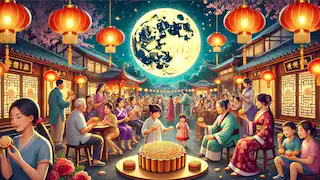The Story of Chang'e and the Moon
Reading Time: 9 min
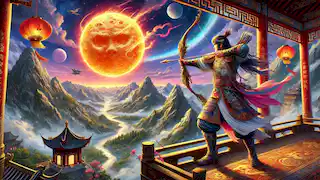
About Story: The Story of Chang'e and the Moon is a Myth from china set in the Ancient. This Dramatic tale explores themes of Romance and is suitable for All Ages. It offers Cultural insights. A tale of love, sacrifice, and the goddess of the moon.
In ancient times, during the reign of the great Emperor Yao, the earth was blessed with abundant life and flourishing landscapes. However, this idyllic existence was threatened when ten suns, who were the sons of Di Jun, the God of the Eastern Sky, appeared together in the heavens. These suns, who normally took turns illuminating the world, decided one day to rise all at once, each determined to outshine the others. Their combined heat scorched the earth, drying up rivers, withering crops, and causing great suffering among the people.
The Emperor, desperate to save his kingdom and its people, called upon Hou Yi, a skilled archer whose fame had spread across the land for his unmatched abilities. Hou Yi was known not only for his strength and precision with a bow but also for his noble heart. He agreed to undertake the perilous mission to save the world from the wrath of the suns.
Hou Yi journeyed to the peak of Kunlun Mountain, the highest mountain in all of China, where he could reach the heavens more easily. With his bow and ten arrows, each imbued with the power of the gods, he took aim at the suns. Hou Yi's arrows were no ordinary projectiles; they were forged by the gods themselves, capable of piercing the heavens and bringing down even the most powerful celestial beings.
One by one, Hou Yi shot down nine of the ten suns, each arrow striking its target with unerring accuracy. As each sun fell, the world grew cooler, and life began to return to the earth. The final sun, terrified by the fate of its brothers, pleaded for mercy. Hou Yi, understanding that the world needed the light and warmth of at least one sun to survive, spared it and allowed it to continue its journey across the sky alone.
The people rejoiced, and Hou Yi was hailed as a hero. His name became synonymous with courage and virtue, and his deeds were celebrated in song and story. As a reward for his bravery, the Queen Mother of the West, a powerful and ancient deity who ruled over the western paradise, presented Hou Yi with a gift of great significance—a vial containing the Elixir of Immortality.
This elixir was no ordinary potion. It was said to grant eternal life to whoever drank it, allowing them to live forever, untouched by time or death. However, Hou Yi, though honored by the gift, was hesitant to drink it. He loved his wife, Chang'e, more than anything in the world, and the thought of living forever without her by his side was unbearable. Hou Yi believed that a life without his beloved would be no life at all, so he decided not to consume the elixir. Instead, he entrusted it to Chang'e, asking her to guard it carefully.
Chang'e was renowned for her beauty, grace, and wisdom. She was deeply devoted to Hou Yi, and their love was known far and wide as one of the great romances of their time. Chang'e understood the responsibility that came with safeguarding the elixir, and she kept it hidden away in their home, knowing that such a powerful gift could attract danger.
Indeed, their happiness and the elixir's power soon drew the attention of those with less noble intentions. Among them was Feng Meng, one of Hou Yi's former apprentices. Feng Meng had once trained under Hou Yi, learning the art of archery, but over time, he had grown envious of his master's fame and the love that the people showed him. This envy festered within Feng Meng, turning into hatred and greed.
Feng Meng coveted the elixir of immortality, believing that if he could obtain it, he would surpass Hou Yi in power and live forever as a god among men. He began to plot, waiting for the right moment to strike. That moment came when Hou Yi was away on a hunt, far from home.
Seizing the opportunity, Feng Meng broke into Hou Yi's home, where he confronted Chang'e. He demanded that she hand over the elixir, threatening her with violence if she refused. Chang'e, though frightened, was determined not to let such a wicked man gain the power of immortality. She knew that if Feng Meng drank the elixir, he would use his newfound power for evil, causing suffering and chaos.
With no other options, Chang'e made a desperate choice. She grabbed the elixir and, before Feng Meng could stop her, she drank it herself. As soon as the elixir touched her lips, Chang'e felt her body begin to change. Her feet lifted off the ground, and she began to ascend into the sky, carried away by the magic of the elixir.
Feng Meng, realizing too late what had happened, could only watch in helpless fury as Chang'e floated higher and higher, leaving the mortal world behind. The elixir, designed to grant eternal life, was so powerful that it lifted Chang'e all the way to the moon, where she would remain forever.
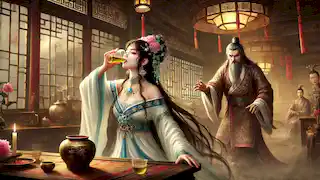
On the moon, Chang'e found herself in a magnificent palace made of cold, silvery light. The palace was beautiful, with walls that shimmered like frost and floors that sparkled like the surface of a frozen lake. However, it was also a place of great solitude. The only companions Chang'e had were a jade rabbit and a woodcutter.
The jade rabbit was a mystical creature, said to have been sent to the moon by the gods. It spent its days under a cassia tree, tirelessly pounding herbs with a mortar and pestle to create the elixir of life. Despite its endless labor, the rabbit was kind-hearted and loyal, offering Chang'e what little companionship it could.
The woodcutter, on the other hand, was a tragic figure. He had been condemned by the gods to chop down the cassia tree on the moon, a task that seemed simple but was, in fact, impossible. Each time the woodcutter struck the tree with his axe, the tree would heal itself, growing back instantly. This endless cycle of futility was his punishment, and like Chang'e, he was destined to remain on the moon for eternity.
Despite the beauty of her surroundings, Chang'e was filled with sorrow. She missed Hou Yi terribly, longing to be reunited with him. Each night, she would gaze down at the earth, hoping to see him and feeling the pain of their separation. Hou Yi, in turn, was devastated when he returned home and learned of what had happened.
Hou Yi's grief was overwhelming. The love of his life had been taken from him, and he was powerless to bring her back. Each night, he would look up at the moon, hoping to catch a glimpse of Chang'e. He began to leave out offerings of her favorite foods on the fifteenth day of the eighth lunar month, believing that on this day, the moon was closest to the earth, and Chang'e might be able to visit him in spirit.
This tradition soon spread among the people, who loved Hou Yi and Chang'e and were moved by their story. They, too, began to leave offerings and celebrate the Mid-Autumn Festival, a time for family reunions and moon gazing. The festival became a time to honor Chang'e and to remember the sacrifices made in the name of love and duty.
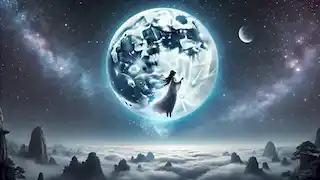
Over the centuries, the story of Chang'e and the moon was passed down through generations, becoming one of China's most cherished legends. It was a story that spoke to the human experience—of love, loss, and the desire to be reunited with those we hold dear.
In the legend, Chang'e is often depicted as a goddess of the moon, a figure of ethereal beauty and grace who watches over the earth from her silver palace. Poets and artists were inspired by her tale, creating works that captured her sorrow and her longing. The image of Chang'e, floating gracefully on the moon, became a symbol of unending love and the enduring connection between those separated by great distances.
During the Mid-Autumn Festival, families would come together to share mooncakes, a traditional pastry that was said to represent the full moon. They would gather outside, under the light of the moon, and tell the story of Chang'e and Hou Yi, reminding themselves of the importance of love, sacrifice, and family. The full moon, bright and round, became a symbol of reunion, a time when families, even those far apart, could feel close to one another.
Chang'e, though forever isolated on the moon, became a source of comfort and inspiration to the people of China. Her story was a reminder that love could endure even the greatest challenges, and that those we love are never truly gone as long as we hold them in our hearts.
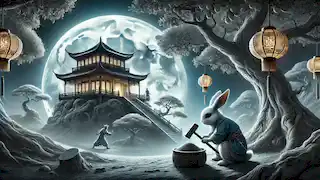
As the years went by, the story of Chang'e continued to evolve. Different regions and cultures within China added their own interpretations and variations, but the core of the story remained the same—a tale of love, sacrifice, and the power of the human spirit.
Hou Yi, despite his deep sorrow, continued to live a life of honor and dignity. He became a wise and just ruler, beloved by his people for his fairness and compassion. But even as he fulfilled his duties, his heart remained with Chang'e. Each night, when the moon rose high in the sky, he would pause to look at it, feeling a connection to his beloved that transcended time and space.
In some versions of the story, it is said that Hou Yi eventually built a palace of his own, where he could live out the rest of his days in peace. There, he would continue to make offerings to Chang'e, hoping that one day, they might be reunited. In others, it is said that Hou Yi eventually ascended to the heavens, where he was reunited with Chang'e, and the two of them lived together in eternal happiness.
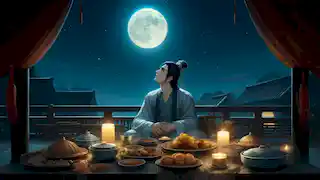
Today, the story of Chang'e and Hou Yi is more
than just a myth—it is a cultural treasure, a symbol of the enduring power of love and the importance of family and tradition. The Mid-Autumn Festival remains one of the most important holidays in China, a time when people come together to celebrate the bonds that connect them, even when they are far apart.
And so, each year, as the full moon rises in the autumn sky, the people of China look up and remember Chang'e, the lady of the moon, and the great love she shared with Hou Yi. They tell her story to their children, ensuring that her legacy lives on, a reminder that love, no matter how distant, can never be extinguished.
